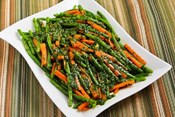Smart preparation and presentation of vegetable entrees not only can enhance the enjoyment of a meal, but they also can boost a diner's perception of the person who prepared it, according to Cornell researchers.
"Simply put, vegetables make people feel more positive about the main course and the cook who prepared it," said Brian Wansink, the John S. Dyson Professor of Marketing at Cornell's Dyson School of Applied Economics and Management and lead author of the study, "How Vegetables Make the Meal: Their Hedonic and Heroic Impact on Perceptions of the Meal and of the Preparer." The study is published online in the journal Public Health Nutrition.
"More vegetables are likely to be served with a meal if preparers know that the addition of vegetables makes them appear to be both a better cook and a better person," report Wansink and his co-authors, Cornell postdoctoral researcher Mitsuru Shimizu and research support specialist Adam Brumberg '86.
This appeal presents a potential nutritional benefit in the United States, where vegetables are served as part of only 23 percent of evening meals.
"While vegetables certainly contribute to making the meal healthier, they can contribute in other ways," Wansink said. "For example, knowing how and why parents and their children perceive vegetables as contributing to the enjoyment of the meal -- other than simply for their nutritional value -- could hold a key to increasing vegetable intake."
With widespread recommendations to increase vegetable consumption among Americans, in particular among children, any tool that can increase servings is welcome, the authors note.
"So if you want to be a hero in your own kitchen, just add veggies to your meals and enjoy the nutritional and emotional benefits they will provide," they say.
For additional information about this study, visit:
<http://foodpsychology.cornell.edu/outreach/veggiesmeal.html>. The research was funded in part by Pinnacle Foods.







